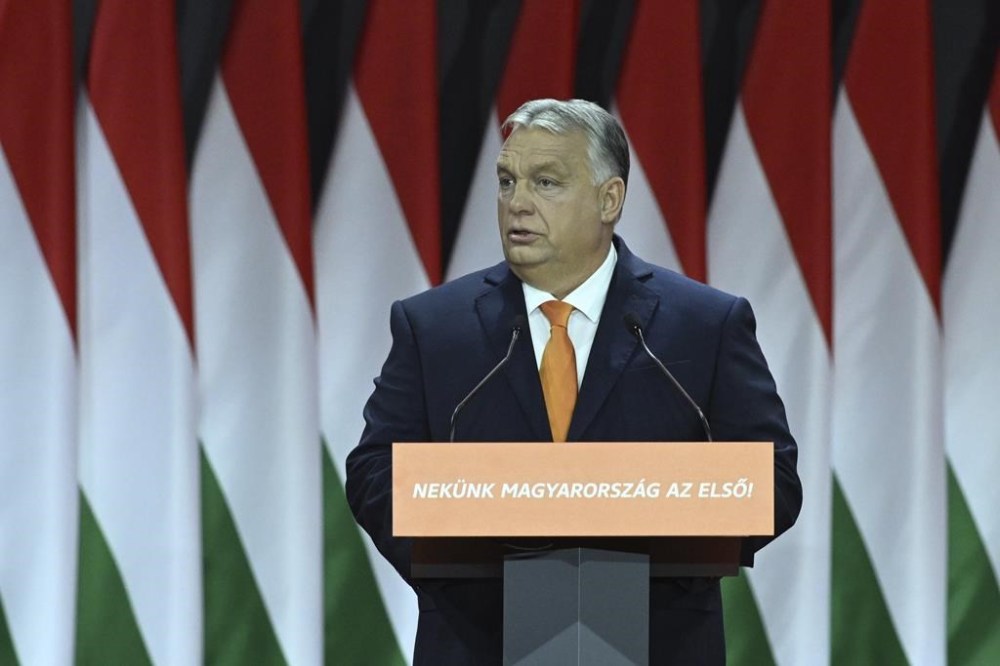Hungary will not agree to starting EU membership talks with Ukraine, minister says
Advertisement
Read this article for free:
or
Already have an account? Log in here »
To continue reading, please subscribe:
Monthly Digital Subscription
$1 per week for 24 weeks*
- Enjoy unlimited reading on winnipegfreepress.com
- Read the E-Edition, our digital replica newspaper
- Access News Break, our award-winning app
- Play interactive puzzles
*Billed as $4.00 plus GST every four weeks. After 24 weeks, price increases to the regular rate of $19.00 plus GST every four weeks. Offer available to new and qualified returning subscribers only. Cancel any time.
Monthly Digital Subscription
$4.75/week*
- Enjoy unlimited reading on winnipegfreepress.com
- Read the E-Edition, our digital replica newspaper
- Access News Break, our award-winning app
- Play interactive puzzles
*Billed as $19 plus GST every four weeks. Cancel any time.
To continue reading, please subscribe:
Add Winnipeg Free Press access to your Brandon Sun subscription for only
$1 for the first 4 weeks*
*$1 will be added to your next bill. After your 4 weeks access is complete your rate will increase by $0.00 a X percent off the regular rate.
Read unlimited articles for free today:
or
Already have an account? Log in here »
Hey there, time traveller!
This article was published 30/11/2023 (660 days ago), so information in it may no longer be current.
BUDAPEST, Hungary (AP) — Hungary will not support any European Union proposal to begin talks on making Ukraine a member of the bloc, a government minister said Thursday.
Gergely Gulyas, the chief of staff to Hungarian Prime Minister Viktor Orbán, said at a news conference in Budapest that it was premature to begin formal talks with Kyiv on the war-ravaged country joining the EU, and that Hungary would not consent to opening the discussions when EU leaders meet in mid-December.
“We are dealing with a completely premature proposal,” Gulyas said, adding that Hungary “cannot contribute to a common decision” on inviting Ukraine to begin the process of joining the bloc.

Earlier this month, the EU’s executive arm recommended allowing Ukraine to open membership talks once it addresses governance issues that include corruption, lobbying concerns, and restrictions that might prevent national minorities from studying and reading in their own languages.
But unanimity among all EU member nations is required on matters involving admission of a new country, giving the nationalist Orbán a powerful veto.
His government has long taken an antagonistic approach to Ukraine, arguing vehemently against EU sanctions on Russia over its invasion and holding up financial aid packages to Kyiv.
Orbán, widely considered one of Russian President Vladimir Putin’s closest allies in Europe, has argued that accession negotiations should not begin with a country that is at war, and that Ukraine’s membership would reorient the system the 27-nation European Union uses to distribute funds to member countries.
Earlier this month, Orbán said that Ukraine is “light years” away from joining the bloc, further signaling that his government would be a major obstacle to Kyiv’s ambitions at next month’s meeting of EU heads of state and government in Brussels.
On Thursday, Gulyas also said Hungary would not support proposed amendments to the EU’s budget, part of which would provide 50 billion euros ($54.5 billion) in long-term aid to Kyiv.
He said the EU was “illegally” withholding funds from Hungary, and that the government would consequently decline to support any budget amendment.
The EU froze billions in funding to Budapest over the alleged failures of Orbán’s government to adhere to EU rule-of-law and corruption standards.
Hungary insists it doesn’t link the frozen EU funds to other issues, but many in Brussels see its veto threats regarding aid and Ukraine’s membership as an attempt to blackmail the bloc into releasing the withheld funds.

